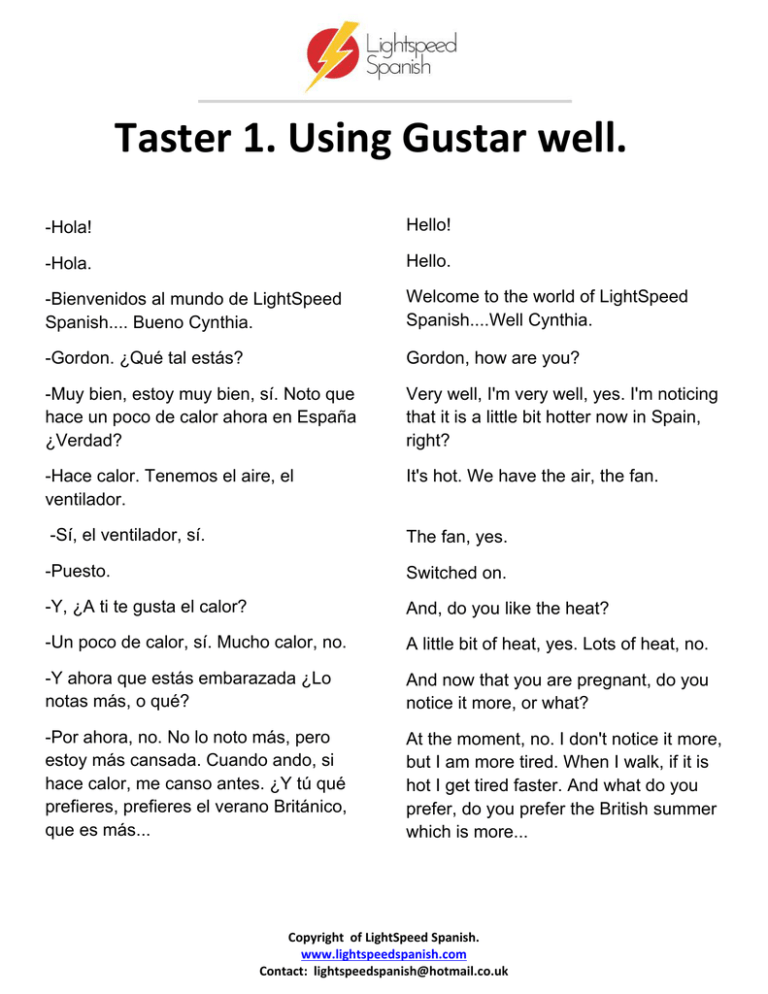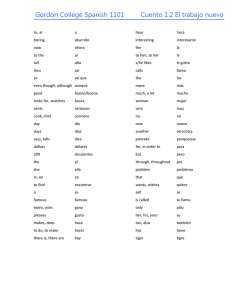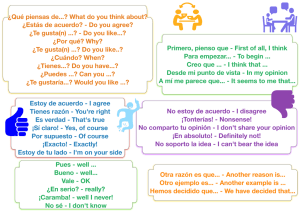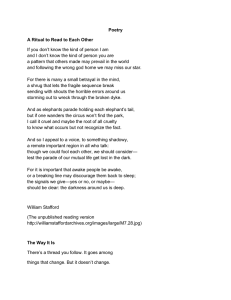Taster 1. Using Gustar well.
Anuncio

Taster 1. Using Gustar well. -Hola! Hello! -Hola. Hello. -Bienvenidos al mundo de LightSpeed Spanish.... Bueno Cynthia. Welcome to the world of LightSpeed Spanish....Well Cynthia. -Gordon. ¿Qué tal estás? Gordon, how are you? -Muy bien, estoy muy bien, sí. Noto que hace un poco de calor ahora en España ¿Verdad? Very well, I'm very well, yes. I'm noticing that it is a little bit hotter now in Spain, right? -Hace calor. Tenemos el aire, el ventilador. It's hot. We have the air, the fan. -Sí, el ventilador, sí. The fan, yes. -Puesto. Switched on. -Y, ¿A ti te gusta el calor? And, do you like the heat? -Un poco de calor, sí. Mucho calor, no. A little bit of heat, yes. Lots of heat, no. -Y ahora que estás embarazada ¿Lo notas más, o qué? And now that you are pregnant, do you notice it more, or what? -Por ahora, no. No lo noto más, pero estoy más cansada. Cuando ando, si hace calor, me canso antes. ¿Y tú qué prefieres, prefieres el verano Británico, que es más... At the moment, no. I don't notice it more, but I am more tired. When I walk, if it is hot I get tired faster. And what do you prefer, do you prefer the British summer which is more... Copyright of LightSpeed Spanish. www.lightspeedspanish.com Contact: [email protected] - ¡Vaya pregunta!... What a question! - ...De temperatura, quiero decir cuando hace calor, en Inglaterra, o aquí? The temperature, I mean when it is hot, in England or here? -Me gusta el clima aquí más como en la primavera hacia verano. I like the climate here more like in spring toward the summer -Sí. Yeah. - El mes de julio no me gusta tanto. En el mes de julio aquí en España hace tanto calor que tienes que beber agua todo el día, pero no vas al baño. I don't like it in July as much. Here in Spain in the month of July it is so hot that you have to drink all day, but you don't go to the toilet. -Pero no vas al baño. But you don't go to the toilet. - ¡No! Es que no vas al baño. Todo sale por el piel. No! It's like you don't go to the toilet. It all comes out of your skin. - Y por el bigote, sí por el bigote. Por aquí. And from your moustache area, or from here. -Sí. Yes. -Pero estos días me está gustando eso de salir con el perro por el campo y en la bicicleta, yo voy en bicicleta con el perro, a veces corro. Pero hoy , por ejemplo ¿A qué hora salí? But these days I'm liking going out with the dog in the countryside and on my bike, I go by bike with the dog, sometimes I run. But today, for example. What time did I go out? -Hoy saliste a las 11:00 más o menos, 11:30. Today you went out at about 11:00, 11:30 -Vale a las 11:00, y para las 11:00 hace mucho calor ahora entonces yo creo que estaba a eso de 33, 34 grados, algo así. Okay at 11:00, and by 11:00 It is really hot now so I think it was about 33,34 degrees, or something like that. -Sí. Hace calor Yes. it is hot. Copyright of LightSpeed Spanish. www.lightspeedspanish.com Contact: [email protected] - Fue un poco mucho. It was a bit much. - Sí el perro no... Yes, the dog wasn't... - Para el Perro. For the dog. - No estaba contento. He wasn't very happy. - Ahora tienes un perro en casa ¿Sí? Now you have a dog in the house, yes? -Sí. Yes. -¿Entonces te gusta la idea de tener a un perro en casa? So, do you like the idea of having a dog in the house? -Sí, es muy bonito tener un perro en casa. Salimos más, ahora. Gracias al perro. Y vamos más al campo. Yes. It is really nice having a dog in the house, we go out more. Thanks to the dog. And we go to the countryside more. -Claro. Of course. -A veces tenemos aventuras, no mucho pero, porque Gordon trabaja todo el día, todo los días. Sometimes we have adventures, not much but, because Gordon works all day every day. -No es cierto. Me gusta trabajar, pero no tanto. That isn't true. I like working, but not that much. -Vale vale. Okay, okay. -Cintia sabes me encantas, Cintia. Siempre tú estás diciendo cosas sobre mi trabajo. Yo trabajo. Trabajo. Hoy es ¿Qué día es? Cynthia you know I love you, Cynthia. You are always saying things about my work, I work. I work. Today is, what day is it? -Hoy es miércoles. Today is Wednesday -El miércoles, así que trabajo, es normal ¿No? Wednesday, So I work. It's normal isn't it? - Sí. Yes. Copyright of LightSpeed Spanish. www.lightspeedspanish.com Contact: [email protected] -Sí. Yes. -Sí. ¿Y a ti te gusta tener un perro? Porque antes no te gustaban los animales mucho. Yes. And do you like having a dog? Because before you didn't like animals much. -Bueno tengo que decir que cuando se porta bien, el perro, me gusta. Cuando se porta mal, le digo... Well, I have to say that when he is good, I like him, When acts badly, I tell him... -Pero... But... -Douglas, se llama Douglas. Douglas. Douglas, he is called Douglas. Douglas. -Es escocés. He is Scottish. -Sí. No me gustas. Pero cuando está haciendo.. Por ejemplo esta mañana. Un ejemplo. Me levanté muy temprano. ¿A qué hora? Yes. I don't like you, But when he is doing.. For example this morning. An example. I got up very early. What time was it? -A las 6:30. At 6:30 -A las 6:30 porque Douglas estaba rascándose debajo de la cama y golpeando la cama vale, entonces. At 6:30 because Douglas was scratching himself under the bed and hitting the bed okay, so. -En mi lado de la cama. My side of the bed. -Sí pero me levanté yo y te quedaste, vale. Luego, yo subí al ático a trabajar como de costumbre, y oía.. Yes but I got up and you stayed, okay. Then, I went up to the attic to work like always, and I heard.. -Madre mía. Oh, god. -Y yo ¿Qué es eso? Bajé, y Douglas estaba comiéndose una revista. En eso no tengo problemas, pero no era la nuestra. And I was like, What is that? I went down, and Douglas was eating a magazine. I don't have a problem with that, but it wasn't ours. Copyright of LightSpeed Spanish. www.lightspeedspanish.com Contact: [email protected] -No, era un catálogo de ¿Cómo se llama? Christian. No, it was a catalogue. What's the catalogue called? Christian. -No sé pero de como... I don't know but it is like... -Es similar a Avon. It is similar to Avon -Sí. Yes. -Es de maquillaje, joyería que una mujer de la clase de inglés... It's one of the English students' Make-up and jewellery catalogue. -Mari paz Mari Paz. -..Mari paz le había dejado a Gordon para que yo echase un vistazo. Mari paz had left it with Gordon for me to look at. -Ayer, solamente ayer. Yesterday, only yesterday. -Vino ayer. Pero el catálogo estaba encima de la mesa, de la mesa grande. No estaba en el suelo, ni en el sofá. Entonces no sé cómo es posible que el perro... El perro. She came yesterday, but the catalogue was on top of the big table, it wasn't on the floor or on the couch so I don't know how it's possible that the dog.. the dog. -Se llama, en Inglés se llama Counter surfing. It is called, in English It's called Counter surfing. -Sí, pero es.. Yes, but it is.. -El ha hecho un poco de Counter surfing. He did a bit of counter surfing. -Sí. Yes. -¿Qué hay de comer? Una revista ¿Por qué no? Tenía hambre, el pobre What is there to eat? A magazine. Why not? He was hungry, bless him. -Claro, tenía hambre. Of course, he was hungry. Copyright of LightSpeed Spanish. www.lightspeedspanish.com Contact: [email protected] -Pero sí, me gusta. Me gusta el ambiente en casa con un animal, con Douglas la mayoría de las veces, pero a veces se pone loquísimo. -Sí. But yes. I like the atmosphere in the house with an animal, with Douglas most of the time. But at others he is absolutely crazy. Yes, he has moments of total craziness, and he runs from the house to the patio then the house and on the patio... He is crazy. Yes. -Pero ¿Te gustan más los cachorros, o te gustan más los perros adultos? But, do you like puppies more, or do you like adult dogs more? -Peros adultos. Adult dogs. -Adultos. Adults. -Sí, sí me encantan. ¿Por qué? Porque no hacen caca por todos sitios. Cuando llegó Douglas, de hecho el era una maquina de cagar ¿No es cierto? Es que.. Yes. Yes I love them. Because they don't poo everywhere. When Douglas got to the house he was in fact a pooing machine. Right? It's like.. -No es que.. No, it's like.. - Hacer caca y mear. Having a poo and weeing. -No es cierto, Douglas tuvo, vale. Cuando era pequeñito, con dos meses, tres meses, Douglas comía muchas cosas del suelo.. y... It isn't true, Douglas had, okay. When Douglas was very little, 2 months, 3 months, Douglas ate lots of things off the floor..and... -Todavía lo hace, ¿eh? He still does it, you know. -Constantemente, tenía diarrea. Y no podía salir a la calle porque no tenía las vacunas He constantly had diarrhoea. And he couldn't go out in the street because he didn't have the injections -Sí Yes. -Sí, tiene momentos de locura total, y corre por la casa y en el patio, y en la casa y en el patio y.. está loco. Copyright of LightSpeed Spanish. www.lightspeedspanish.com Contact: [email protected] -Y estaba en casa con diarrea, y con Gordon no estaba muy contento de tener un perro, no estaba muy contento con Douglas y conmigo. And he had diarrhoea in the house, and with Gordon not being very happy about having a dog, he wasn't very happy with Douglas or with me. -Correcto. Correct. - No estaba contento. He wasn't happy. -Ahora me encanta. Now I love him. - La palabra divorcio se mencionó. The word divorce was mentioned. -Sí, Ahora me encanta. Porque ahora él hace sus cosas en la calle, ahora. Y bueno pero, tenemos baldosas en el suelo entonces no era un problema enorme. Simplemente teníamos que limpiar todo los días. Yes. Now I love him. Because now he does his business outside, now. And well, but we have tiling on the floor so it wasn't that big of a problem. We just had to simply clean every day. - Sí Yes. -Y a mí no me gusta limpiar caca, no sé. No es mi.. And I don't like cleaning up poo, I don't know. It isn't my.. - No le gusta limpiar caca pero va a tener un bebe en septiembre. He doesn't like cleaning up poo but he is going to have a baby in September. -Es diferente. Es diferente la caca de un bebe huele a gloria. It's different. It's different , babys' poo smells like heaven. -A gloria tampoco diría yo. Caca y gloria no.. Not like heaven. Poo and heaven don't.. -Sí. Don't go together. -No van juntos. Okay, so you like Douglas. -Vale, entonces te gusta Douglas. -Sí, me gusta mucho Douglas, sí. -¿Sí? Yeah. Yes, I like Douglas a lot, yes. Yes? Yes. I love him. -Sí, me encanta. Copyright of LightSpeed Spanish. www.lightspeedspanish.com Contact: [email protected] -¿Y te gusto? And do you like me? - ¿Tu? Me gustas mucho. Mucho mucho. You? I like you a lot. A lot a lot. -Pues gracias, pues me gustas también, a mi. Well thank you, I like you too. -Y, vale. Gordon. ¿Hay mucha diferencia entre los vecinos en Inglaterra y los vecinos aquí, te gustan los vecinos aquí en nuestra calle? And, okay Gordon. are there differences between the neighbours in England and the neighbours here? Do you like the neighbours here in our street? -Me encantan. I love them. -Te encantan, vale. You love them, okay. -Porque no hay. Because there are none. -Pero sí hay vecinos ¿Te gustan? But there are, do you like them? -Sí hay. Sí, me gustan. Me gusta... Estamos en una zona muy tranquila. Es una urbanización pero estamos cerca de un pueblo. Yeah, yeah I like.. We are in a very calm area. It's an urbanization but we are close to a village. -Sí. Yeah. -Y me encanta la actitud de la gente en la zona. Es... Te hablan, te preguntan cosas, como, les interesa tu vida un poco ¿No? And I love the attitude of the people in the area. It's... They talk to you, they ask you things, like, they are interested in your life a little bit, no? -¿Entonces tú crees que a ellos les gustas? So do you think they like you? -Espero que sí, pero no sé. Bueno sí a la gente del pueblo porque damos una clase de Inglés. I hope so, but I don't know. Well yes the people from the village because we do an English class. Copyright of LightSpeed Spanish. www.lightspeedspanish.com Contact: [email protected] -Sí. Yes. - Como gratis cada martes, entonces sí. Like, free every Tuesday, yeah. -A ellos sí. So they like you. -Les gusto. They like me. -Sí. Yes. -Sí, pues my bien. Well very good. - Te aman muchísimo ¿Verdad? They love you a lot right? - No sé, eso no sé. I don't know That I don't know. -Vale, entonces. Muchas gracias Cynthia. Okay. Well Thank you a lot Cynthia. -Y a ti Gordon, muchas gracias. You too Gordon. Thank you a lot. -Vale. Okay. Copyright of LightSpeed Spanish. www.lightspeedspanish.com Contact: [email protected] Tarea sobre Gustar et al. (and the rest) And now for your homework. We will offer you two levels of homework: one in the present tense and the second in the past, for those who want to challenge themselves more! To get the order right use this system: FIRSTLY: Who is being pleased/enchanted/fascinated, etc? ADD PRONOUN= me, te, le, nos, os, les. SECONDLY: Who is doing the pleasing? ADD THE VERB IN THE CORRECT PERSON = gusto, gustas, etc. Or encanto, encantas, etc. Or fascino, fascinas, etc. THIRDLY: Add any other information. e.g. el grupo, tú, el concierto, etc. Copyright of LightSpeed Spanish. www.lightspeedspanish.com Contact: [email protected] Now, translate the following sentences into Spanish. Present tense. 1, I really like the concert. _________________________________________________________________ 2, I really like you (tú). _________________________________________________________________ 3, He says that he loves me. (use encantar) _________________________________________________________________ 4, We like the singers in the band. _________________________________________________________________ 5, We think that they like us. ________________________________________________________________ 6, Do you like me? (use gustar) _________________________________________________________________ Copyright of LightSpeed Spanish. www.lightspeedspanish.com Contact: [email protected] 7, Yes, I love you. (tú, use encantar) _________________________________________________________________ 8, I like them as people. _________________________________________________________________ 9, They say that they don't like you. (tú) _________________________________________________________________ 10, I don't like them either. _________________________________________________________________ Copyright of LightSpeed Spanish. www.lightspeedspanish.com Contact: [email protected] The past tense. Before you start with the sentences, use this as your benchmark for deciding if you should use the Preterite or the Imperfect: - When you use the Preterite = gustó/gustaron, etc, you are saying that you liked something and that you still like it. - When you use the Imperfect = gustaba/gustaban, etc, you are saying that you used to like something, but now it's likely that you don't. e.g. Me gustó la cena. = I liked the dinner (and I still like it in my mind.) Me gustaba ir a la playa cuando era joven. = I used to like going to the beach when I was young. (But now I don't really like it/do it). Remember: These verbs can be used in all of the persons in the past, just as we have done in the present. The same rule on the Preterite and the Imperfect applies to the other Impersonal verbs, like Fascinar, Molestar, etc. Copyright of LightSpeed Spanish. www.lightspeedspanish.com Contact: [email protected] Translate the following past tense sentences into Spanish. 1, We used to like the Beach Boys when we were teenagers. _________________________________________________________________ 2, I used to like you a lot when we were in the university. (usted) _________________________________________________________________ 3, The discourse fascinated me. (and it still does) _________________________________________________________________ 4, I tried the fish and I liked it. (and still do) _________________________________________________________________ 5, They used to like coming here before. Now it seems that they don't like it all. _________________________________________________________________ 6, My son used to love banana sandwiches. _________________________________________________________________ 7, Did you used to like me when we were little? (tú) _________________________________________________________________ Copyright of LightSpeed Spanish. www.lightspeedspanish.com Contact: [email protected] 8, The man tried the sauce and he didn't like it at all. _________________________________________________________________ 9, I never liked you. (tú/ and I still don't) _________________________________________________________________ 10, Did you like the party? Yes, I liked it a lot! (tú) _________________________________________________________________ So, how did that go for you? Did you find it a challenge, or was it easy? In the SER SOCIO membership program we cover Gustar again and give you a fantastic system that helps you use the verbs Gustar and Encantar without having to do all of those mental gymnastics in your head, so watch out for that. If you like the way this lesson has been structured and you want to be enjoy the weekly lessons that we will be offering, all you need to is to sign up for the membership program. All the details can be found on our website: http://www.lightspeedspanish.co.uk/ Pues, eso es todo. Nos vemos en la siguiente clase. Copyright of LightSpeed Spanish. www.lightspeedspanish.com Contact: [email protected] Answers: 1, Me gusta mucho el concierto. = To me, it is pleasing. 2, Me gustas mucho (tú). = To me, you are pleasing. 3, Él dice que le encanto (yo). =To him, I am enchanting. 4, Nos gustan los cantantes en el grupo/la banda. = To us, they are pleasing. 5, Pensamos que les gustamos (nosotros). = To them, we are pleasing. 6, ¿Te gusto (yo)? = To you, am I pleasing? 7, Sí, me encantas (tú). = To me, you are enchanting. 8, Me gustan como personas. = To me, they are pleasing. 9, Dicen que no les gustas (tú). = To them, you are not pleasing. 10, No me gustan (ellos) tampoco. = To me they are not pleasing neither.(lit.) Past tense 1, Nos gustaban los Beach Boys cuando éramos adolescentes. 2, (Usted) Me gustaba mucho cuando estábamos en la universidad. 3, El discurso me fascinó. 4, Probé el pescado y me gustó. 5, Les gustaba venir aquí antes. Ahora parece que no les gusta nada/ en absoluto. 6, A mi hijo le gustaban los sándwiches de plátano. 7, ¿Te gustaba (yo) cuando éramos pequeños? 8, El hombre probó la salsa y no le gustó nada/ en absoluto. 9, Nunca me gustaste. 10, ¿Te gustó la fiesta? Sí, me gustó mucho. Copyright of LightSpeed Spanish. www.lightspeedspanish.com Contact: [email protected]






